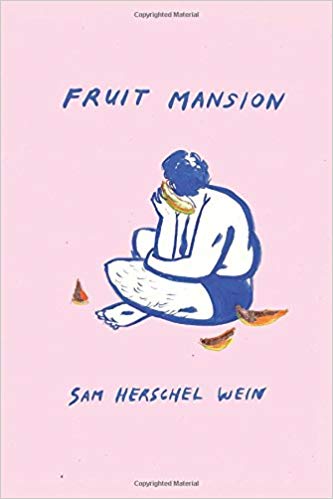- Home
- About
- Submit
- Features
- Interviews
- Book Reviews
- Previous Issues
- Blog
- Contact
-
Issue #25 Spring 2023
- Issue #25 Art Spring 2023 >
-
Issue #25 Poetry Spring 2023
>
- Emma Bolden Spring 2023
- Ronda Piszk Broatch Spring 2023
- M. Cynthia Cheung Spring 2023
- Flower Conroy Spring 2023
- Jill Crammond Spring 2023
- Sandra Crouch Spring 2023
- Satya Dash Spring 2023
- Rita Feinstein Spring 2023
- Dan Fliegel Spring 2023
- Lisa Higgs Spring 2023
- Dennis Hinrichsen Spring 2023
- Mara Jebsen Spring 2023
- Abriana Jetté Spring 2023
- Letitia Jiju Spring 2023
- E.W.I. Johnson Spring 2023
- Ashley Kunsa Spring 2023
- Susanna Lang Spring 2023
- James Fujinami Moore Spring 2023
- Matthew Murrey Spring 2023
- Pablo Otavalo Spring 2023
- Heather Qin Spring 2023
- Wesley Sexton Spring 2023
- Ashish Singh Spring 2023
- Sara Sowers-Wills Spring 2023
- Sydney Vogl Spring 2023
- Elinor Ann Walker Spring 2023
- Andrew Wells Spring 2023
- Erin Wilson Spring 2023
- Marina Hope Wilson Spring 2023
- David Wojciechowski Spring 2023
- Jules Wood Spring 2023
- Ellen Zhang Spring 2023
- BJ Zhou Spring 2023
- Jane Zwart Spring 2023
- Issue #25 Fiction Spring 2023 >
- Issue #25 Nonfiction Spring 2023 >
-
Issue #26 Fall 2023
- Issue #26 Art Fall 2023 >
-
Issue #26 Poetry Fall 2023
>
- Fasasi Abdulrosheed Oladipupo Fall 2023
- Christopher Ankney Fall 2023
- Magdalena Arias Vásquez Fall 2023
- John Peter Beck Fall 2023
- Mihir Bellamkonda Fall 2023
- Benjamin Bellas Fall 2023
- Michael Carson Fall 2023
- Kevin Clark Fall 2023
- Aaron Coleman Fall 2023
- Mark DeCarteret Fall 2023
- Denise Duhamel Fall 2023
- Brandel France de Bravo Fall 2023
- Tina Gross Fall 2023
- Amorak Huey Fall 2023
- James Kimbrell Fall 2023
- Casey Knott Fall 2023
- Stephen Lackaye Fall 2023
- Cynthia Manick Fall 2023
- Savannah McClendon Fall 2023
- John Muellner Fall 2023
- Mollie O’Leary Fall 2023
- Joel Peckham Fall 2023
- Natalia Prusinska Fall 2023
- henry 7. reneau, jr. Fall 2023
- Esther Sadoff Fall 2023
- Hilary Sallick Fall 2023
- Kelly R. Samuels Fall 2023
- Issue #26 Fiction Fall 2023 >
-
Issue #27 Spring 2024
- Issue #27 Art Spring 2024 >
-
Issue #27 Poetry Spring 2024
>
- Terry Belew Spring 2024
- Dustin Brookshire & Diamond Forde Spring 2024 Spring 2024
- Dustin Brookshire & Caridad Moro-Gronlier Spring 2024 Spring 2024
- Charlie Coleman Spring 2024
- Isabelle Doyle Spring 2024
- Reyzl Grace Spring 2024
- Kelly Gray Spring 2024
- Meredith Herndon Spring 2024
- Mina Khan Spring 2024
- Anoushka Kumar Spring 2024
- Cate Latimer Spring 2024
- BEE LB Spring 2024
- Grace Marie Liu Spring 2024
- Sarah Mills Spring 2024
- Faisal Mohyuddin 2024
- Marcus Myers Spring 2024
- Mike Puican Spring 2024
- Sarah Sorensen Spring 2024
- Lynne Thompson Spring 2024
- Natalie Tombasco Spring 2024
- Alexandra van de Kamp Spring 2024
- Donna Vorreyer Spring 2024
- Fiction #27 Spring 2024 >
- Nonfiction #27 Spring 2024 >
Book Review: Fruit Mansion by Sam Herschel Wein
Sam Herschel Wein is a poetry editor for The Blueshift Journal and is co-founder of Underblog. His chapbook Fruit Mansion (Split Lip Press, 2017) was selected as the winner of the 2016 Turnbuckle Chapbook prize. Recent work has appeared in Vinyl Poetry, Pretty Owl Poetry, Connotation Press, Glass: A Journal of Poetry, Cotton Xenomorph, and more.
|
Review
|
A Review of Sam Herschel Wein's Fruit Mansion
Sam Herschel Wein’s Fruit Mansion is an invitation to bite into the sweet and sour pulp of his poems about space, coming-to-age, sexuality, body, and appetite represented in its many facets. Wein invites hungry readers to the table, where his reoccurring food conceit provides comfort as the uncomfortable is confronted. In Wein’s “Angst in Threes,” the poem speaks to both the actualization and angst that comes with recognizing sexuality: “Everything is sex. I never asked.” The staccato sentences speak to the direct, matter-of-fact realization of the situation. Even in recognizing the situation, the following statements hide a complexity that feels relatable, yet not easily explainable: “I actor / actress. I the part. I playing stage.” The poem’s speaker observes and inherits the behaviors that everyone around exhibits. The observations do not arrive to an explainable analysis, but simply, the speaker accepts the feelings as natural: “Everyone is naked. Just so young. Just so hungry.” The success of “Angst in Threes” is that the poem depicts a natural actualization of sexuality that most people experience, yet any complexity that arises from the subject is a result of the reader’s own projection. Wein presents a simple coming-to-age moment through a direct tone as he allows readers to add the complexity of reaching sexual maturity and their relationship to sexuality. In “Asking for Sugar,” Wein changes the direction and atmosphere of his poems, channeling an uncomfortable confrontation. The poem turns from an appetite for sweetness to the acidic sensation of slit taste buds and gums: Pink grapefruits, Wein’s speaker experiences words forced into their mouth, showing the danger in boundaries crossed, which adds importance to consent, even when the words of the speaker are limited. The poem ends on an emotional singe:
[…] a pink so plush Wein’s poems interrogate run-ins with homophobia and misogyny that many queer bodies experience, alluding to the internalization that the antagonist of “Asking for Sugar” displays. The disrespect against boundaries and consent is a sign of the complex power dynamics Wein captures in his poem, adding to the uncomfortable, bitter scenario.
“Hey Fat Boy” appears after “Asking for Sugar,” sharing the same level of shame that antagonists force out of queer and fat bodies, pressuring marginalized people into internalized feelings. Wein explores desirability politics, and the complexity that comes with bodies that do not adhere to the heteronormative expectations of what a body is supposed to appear and act as. For instance, the second stanza of “Hey Fat Boy” shows how shame results from othering: bet if he asked you to be skinny, boy, The unhealthy outcome of body-shaming leads the subject of the poem to a general reaction. The subject’s response is to conform to cultural criticism of what a body is supposed to look like, rather than propose a problem with how others perpetuate body expectations. “Hey Fat Boy” addresses a projected persona that results in an unhealthy internalization, which upsets the positive connotations associated with appetite such as desire and pleasure. Instead, the persona being addressed appeases to the chastising antagonist, and adopts the negative connotations of appetite such as obsession. For the subject, obsession comes in the form of not eating, and by proxy, not eating signifies the obsession of wanting to fit what is considered desirable: “bet you couldn’t have asked / for anything, or seconds, / or a piece of cheese.” The poem represents the indignity that queer and fat bodies face because of others’ easy acceptance of what society deems desirable or attractive, without realizing the harm and falsity of basing one’s own standpoint off of a cultural norm.
Fruit Mansion is a collection of abundance, feeling much like home, which is full of confrontation with family, friends, strangers, and society as a whole. Wein’s poems experience a range of situations, taking on personas that struggle and survive on their own. The reader witnesses the desire that comes with an appetite to continue to move forward for the opportunity to provide nourishment for those who connect to Wein’s verses. Fruit Mansion is ultimately a space for those reconciling their disparities, and where healing can begin to take form. |
|
Miguel is the Book Review Editor for Jet Fuel Review. As an editor, his main concern is centering on marginalized voices. He appreciates radical, unapologetic writers, who can explore, both, the emotional and intellectual stresses found in examining the systemic results lived in a body's political standpoint. He has been published in EFNIKS, Rogue Agent, and others. He also writes for the Jet Fuel Review blog: Not Your Binary: A QTPOC Reading Column.
|
- Home
- About
- Submit
- Features
- Interviews
- Book Reviews
- Previous Issues
- Blog
- Contact
-
Issue #25 Spring 2023
- Issue #25 Art Spring 2023 >
-
Issue #25 Poetry Spring 2023
>
- Emma Bolden Spring 2023
- Ronda Piszk Broatch Spring 2023
- M. Cynthia Cheung Spring 2023
- Flower Conroy Spring 2023
- Jill Crammond Spring 2023
- Sandra Crouch Spring 2023
- Satya Dash Spring 2023
- Rita Feinstein Spring 2023
- Dan Fliegel Spring 2023
- Lisa Higgs Spring 2023
- Dennis Hinrichsen Spring 2023
- Mara Jebsen Spring 2023
- Abriana Jetté Spring 2023
- Letitia Jiju Spring 2023
- E.W.I. Johnson Spring 2023
- Ashley Kunsa Spring 2023
- Susanna Lang Spring 2023
- James Fujinami Moore Spring 2023
- Matthew Murrey Spring 2023
- Pablo Otavalo Spring 2023
- Heather Qin Spring 2023
- Wesley Sexton Spring 2023
- Ashish Singh Spring 2023
- Sara Sowers-Wills Spring 2023
- Sydney Vogl Spring 2023
- Elinor Ann Walker Spring 2023
- Andrew Wells Spring 2023
- Erin Wilson Spring 2023
- Marina Hope Wilson Spring 2023
- David Wojciechowski Spring 2023
- Jules Wood Spring 2023
- Ellen Zhang Spring 2023
- BJ Zhou Spring 2023
- Jane Zwart Spring 2023
- Issue #25 Fiction Spring 2023 >
- Issue #25 Nonfiction Spring 2023 >
-
Issue #26 Fall 2023
- Issue #26 Art Fall 2023 >
-
Issue #26 Poetry Fall 2023
>
- Fasasi Abdulrosheed Oladipupo Fall 2023
- Christopher Ankney Fall 2023
- Magdalena Arias Vásquez Fall 2023
- John Peter Beck Fall 2023
- Mihir Bellamkonda Fall 2023
- Benjamin Bellas Fall 2023
- Michael Carson Fall 2023
- Kevin Clark Fall 2023
- Aaron Coleman Fall 2023
- Mark DeCarteret Fall 2023
- Denise Duhamel Fall 2023
- Brandel France de Bravo Fall 2023
- Tina Gross Fall 2023
- Amorak Huey Fall 2023
- James Kimbrell Fall 2023
- Casey Knott Fall 2023
- Stephen Lackaye Fall 2023
- Cynthia Manick Fall 2023
- Savannah McClendon Fall 2023
- John Muellner Fall 2023
- Mollie O’Leary Fall 2023
- Joel Peckham Fall 2023
- Natalia Prusinska Fall 2023
- henry 7. reneau, jr. Fall 2023
- Esther Sadoff Fall 2023
- Hilary Sallick Fall 2023
- Kelly R. Samuels Fall 2023
- Issue #26 Fiction Fall 2023 >
-
Issue #27 Spring 2024
- Issue #27 Art Spring 2024 >
-
Issue #27 Poetry Spring 2024
>
- Terry Belew Spring 2024
- Dustin Brookshire & Diamond Forde Spring 2024 Spring 2024
- Dustin Brookshire & Caridad Moro-Gronlier Spring 2024 Spring 2024
- Charlie Coleman Spring 2024
- Isabelle Doyle Spring 2024
- Reyzl Grace Spring 2024
- Kelly Gray Spring 2024
- Meredith Herndon Spring 2024
- Mina Khan Spring 2024
- Anoushka Kumar Spring 2024
- Cate Latimer Spring 2024
- BEE LB Spring 2024
- Grace Marie Liu Spring 2024
- Sarah Mills Spring 2024
- Faisal Mohyuddin 2024
- Marcus Myers Spring 2024
- Mike Puican Spring 2024
- Sarah Sorensen Spring 2024
- Lynne Thompson Spring 2024
- Natalie Tombasco Spring 2024
- Alexandra van de Kamp Spring 2024
- Donna Vorreyer Spring 2024
- Fiction #27 Spring 2024 >
- Nonfiction #27 Spring 2024 >


